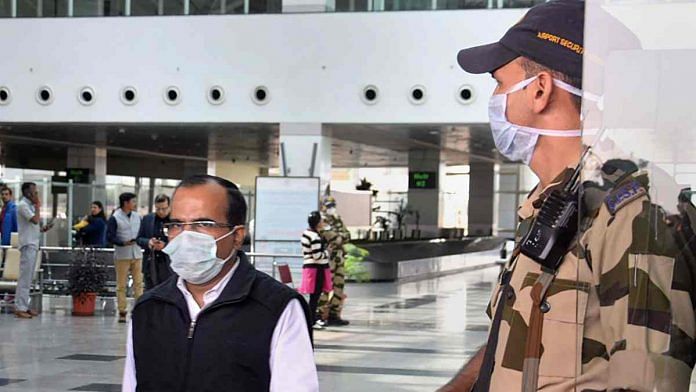New Delhi: India doesn’t have enough virologists and pulmonologists to deal with new outbreaks such as the coronavirus or develop vaccines against such viruses, according to health experts.
Government data showed there is one doctor for every 1,457 people in India. This ratio is lower than the World Health Organization (WHO) recommendation of 1:1,000.
However, when it comes to specialists, the number is even lower.
For doctors in India to specialise in pulmonology, they first need to get an MBBS degree, which is a five-year course, followed by a postgraduate degree — MD or MS.
Then comes a super-specialty medical degree, known as Doctorate of Medicine or DM, which is awarded to postgraduate medical specialists after they complete three years of specialisation.
Dr V.K. Monga, Dean of the Indian Medical Association’s College of General Practitioners, told ThePrint that India has very few pulmonologists with a DM.
“In Delhi alone, there are probably 25 pulmonologists. If that is the situation in the capital, you can only imagine what it must be like in the rest of the country,” Monga said.
“Total registered qualified chest specialists (pulmonologists) in India are around 2,500. Total seats for DM/MD pulmonary medicine are around 700 in India,” Monga added.
T.J. John, a professor at the Christian Medical College in Vellore, agreed that India does not have enough pulmonologists to deal with new viral outbreaks, such as a the novel coronavirus.
When it comes to virologists, John added, the numbers are dismally low. He, however, didn’t mention the number of virologists in India.
Virologists are microbiologists who study virus-like agents, the microorganisms that rapidly duplicate and result in the spread of viruses.
“Shouldn’t every medical college have a virology unit?” John asked.
As of now, India has 43 active cases of the novel coronavirus.
Amid the coronavirus scare, at least three cases of H1N1, popularly known as swine flu, have been reported too.
Also read: Coronavirus becomes dangerous when it reaches the lungs
‘Not responding fast enough…’
Speaking to ThePrint, Gagandeep Kang, executive director of the Translational Health Science and Technology Institute, Faridabad, said while there are virology labs set up by the Indian Council of Medical Research, India does not really have enough virologists who are doing research that will lead to new treatments.
However, she added, steps are being taken in that direction.
The government’s Department of Biotechnology is one of the founding partners of the Coalition for Epidemic Preparedness Innovations (CEPI), which aims to identify gaps and fast-track research through international collaborations in the time of global pandemics, so that researchers are able to respond faster.
The CEPI was established shortly after the Western African Ebola virus epidemic, which killed over 11,000 people between 2013 and 2016.
“The DBT has made a substantial investment setting up a parallel programme called IN-CEPI,” said Kang, who is the vice-chairperson of the CEPI.
It is through the support of this collaboration that the US-based Moderna was able to produce the first trial vaccines for the novel coronavirus, within weeks of obtaining the genome sequence of the virus from China.
“While we (India) are not responding fast enough in R&D in this particular epidemic, the idea is that for future epidemics we should be able to respond as quickly as anybody else,” Kang said.
She added that at present two Indian companies — Serum Institute of India and Biological E. Ltd — are already part of the CEPI.
Zydus Cadila, meanwhile, has already started working on a vaccine for coronavirus.
The Serum Institute of India, Pune, and the Biological E. Ltd are also working on developing the right collaborations for future vaccines.
Indian vaccine companies are very popular
Kang pointed out that when it comes to global supply of vaccines at accessible prices, “Indian vaccine companies are where everybody turns to these days”.
“One example of when Indian vaccines saved the day was with meningitis in the sub-Saharan African belt,” Kang said.
The meningitis A vaccine (MenAfriVac), manufactured by Serum Institute of India, was approved by the WHO in 2015 for use in infants in sub-Saharan African populations.
The vaccine took about five years to develop and was able to substantially reduce meningitis cases in the region.
“However, India now needs to start thinking about ways to make vaccines in less than a year, as well as repurposing antivirals to treat those who are really sick during an epidemic,” Kang added.
Also read: Seasonal flu far more common than coronavirus, but its vaccine is not popular in India



